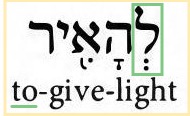The ancient language of ivrit ( עברית ) Genesis #8
Welcome back to my DTube Hebrew reading & language series.
The full study is now on line covering the Alef-Beyt here in my blog. This is a beginners program to teach letters, vowels, and reading. The vowels are marked in this bible and are designed to help avoid confusion on what a word is and how it is pronounced. The confusion is obvious in the hundreds of interpretations globally. In modern Hebrew, only children need a niqqud or vowel marking for each letter. Old manuscripts also usually have vowels marked.
This week's reading is from Genesis 1:15 onward.
We are talking about the naming of the day, the night, and the setting of the stars in the expanse. I really try to keep the lessons short so we can learn a few new things each time we read.


Here you have today's lesson in a nutshell. Several examples of (m) and (f) nouns in their plural forms and an example of an infinitive verb. Infinitives always start with a lamed with the vowel shvah (:) under them.
Great and Small
or big and little if you like.


These are the adjectives used for feminine nouns. We can tell this by looking at the ending of the plural noun "lights". It ends with tav which is one way to tell that this noun is feminine.
You can see that the hey at the beginning of each is the word "the" and it also refers the the only big light and the only small light by context. In this case, English works the same way, my interpretation reads, "God made two light sources larger than the rest, the bigger one rules the day and the smaller one rules the night, and stars..." You can see that removing the word "one" would sound bad in English. It would not sound bad in Spanish without the word 'uno' and it would be left out - not necessary.
There is no such thing as a "translation" because everything needs to be interpreted and has the translator's bias or twist incorporated. A a trilingual person, I make translation decisions all day every day. Should I use phrase-A which works, or phrase-B which also works? I have to choose which one works as I speak or write in daily life.
Here are the links
Please click over to DTube and read the above passage with me in Hebrew.
▶️ DTube
▶️ IPFS
Get your Hebrew Bible now!
Click here to obtain the book we are using. It is a free download - or browser usable.
Thanks for taking the time to watch and read.
Shabbat Shalom
I give no opinion, but yours are welcome below
Excellent, for beginners, and above all is what you transmit the bible.
Fui al traductor y leí el propósito y el tema de la publicación. Cómo necesito de este idioma original para conocer un poco más. Aunque tengo un léxico Fuego Castellano, gracias y espero aprender algo. Excelente
Gracias. Tu blog esta muy bien hecho. Te sigo
Many Arabic words are derived from Hebrew, which proves that the Jews lived long with the Arabs, and that our two languages are very close.
In fact we lived side by side without serious problems, unfortunately this is not the case today and it is a pity.
I hope that in the future all this animosity will be reabsorbed and we will be able to live in peace with our very close cousins.
@hebrew
Thanks for the Hebrew this post very important lesson and useful.
your good work and great work
For your post propagation.
Upvote/Resteem
Very interesting as always your classes @hebrew, always learn something new with your publications, good post.
That’s a great idea making your lesson on Dtube. I’m very curious!
Seeing all these written Hebrew words, you literally have be an artist to actualy write it correctly. That’s the beauty of Hebrew language, you are all artists. However, while going through these words few more times, it doesn’t seem so difficult. I guess practice is what it takes.
I used to write my letters for the cover images in the early lessons. My blog is a start to finish beginners course.
Thank you so much sir for visiting my blog@hebrew
That would be fantastic Ivrit language post @hebrew. Dtube very useful for who want to study. Absolutely your support highly appreciated. I never know anyone try to develop language skills here. But you did it already.
@hebrew, That's excellent Dtube reading language series given this time. I appreciate your every task for provide ancient language of Ivrit. This time introducing from Genesis 1:15 onward. Well introducing for follow easier to beginners and already start like as mine. Thanks for every priceless effort.
Genesis 1 vs 15
That was the point where God created light which he named day and darkness which he named night. I love biblical words because they are fruit to the soul. Thanks @hebrew for sharing this wonderful word of God.
Great lesson!
I do learn every time I see your lesson.
I can clearly see the meaning in the great one and the small one in Hebrew. To write “one” is very easy. I completely understand that you can’t literally translate from English to Hebrew. In my language of origin it’s exactly the same. It would not make much of a sense if I tried to translate It literally word by word. Hebrew is a beautiful language.
yes, brother he is doing a great job!